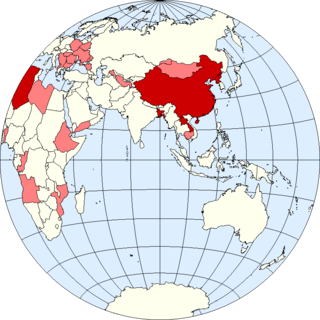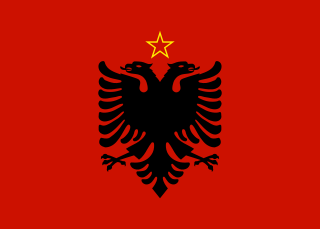
Albania, officially the Republic of Albania, is a country in Southeastern Europe. It is situated in the Balkans, and is located on the Adriatic and Ionian Seas within the Mediterranean Sea and shares land borders with Montenegro to the northwest, Kosovo to the northeast, North Macedonia to the east, and Greece to the south. The country displays varied climatic, geological, hydrological, and morphological conditions, in an area of 28,748 km2 (11,100 sq mi). The landscape ranges from the snow-capped mountains in the Albanian Alps and the Korab, Skanderbeg, Pindus, and Ceraunian Mountains, to the hot and sunny coasts of the Adriatic and Ionian Seas along the Mediterranean. Tirana is its capital and largest city, followed by Durrës, Vlorë, and Shkodër.

Enver Halil Hoxha was an Albanian communist politician who was the authoritarian ruler of Albania from 1944 until his death in 1985. He was First Secretary of the Party of Labour of Albania from 1941 until his death. He was also a member of the Politburo of the Party of Labour of Albania, chairman of the Democratic Front of Albania, and commander-in-chief of the armed forces and ruled the country from 1944 until his death. He was the 22nd Prime Minister of Albania from 1944 to 1954 and at various times was both foreign minister and defence minister of the People's Socialist Republic of Albania.
The history of North Macedonia encompasses the history of the territory of the modern state of North Macedonia.

Yugoslavia was a country in Southeast and Central Europe for most of the 20th century. It came into existence after World War I in 1918 under the name of the Kingdom of Serbs, Croats and Slovenes by the merger of the provisional State of Slovenes, Croats and Serbs with the Kingdom of Serbia, and constituted the first union of the South Slavic people as a sovereign state, following centuries in which the region had been part of the Ottoman Empire and Austria-Hungary. Peter I of Serbia was its first sovereign. The kingdom gained international recognition on 13 July 1922 at the Conference of Ambassadors in Paris. The official name of the state was changed to Kingdom of Yugoslavia on 3 October 1929.
Albania is a unitary parliamentary constitutional republic, where the President of Albania is the head of state and the Prime Minister of Albania the head of government in a multi-party system. The executive power is exercised by the Government and the Prime Minister with its Cabinet. Legislative power is vested in the Parliament of Albania. The judiciary is independent of the executive and the legislature. The political system of Albania is laid out in the 1998 constitution. The Parliament adopted the current constitution on 28 November 1998. Historically Albania has had many constitutions. Initially constituted as a monarchy in 1913, Albania became briefly a republic in 1925, and then a democratic monarchy in 1928. In 1939 Albania was invaded by Fascist Italian forces, imposing a puppet state, and later occupied by Nazi German forces. Following the partisan liberation from the Nazis in 1944 a provisional government was formed, which by 1946 had transformed into a Communist one party state. In March 1991 democracy was restored with multi-party elections.

A communist state, also known as a Marxist–Leninist state, is a one-party state that is administered and governed by a communist party guided by Marxism–Leninism. Marxism–Leninism was the state ideology of the Soviet Union, the Comintern after Bolshevisation and the communist states within the Comecon, the Eastern Bloc, and the Warsaw Pact. Marxism–Leninism currently still remains the ideology of a few parties around the world. After its peak when many communist states were established, the Revolutions of 1989 brought down most of the communist states, however, it is still the official ideology of the ruling parties of China, Cuba, Laos, and Vietnam. During most of the 20th century, before the Revolutions of 1989, around one-third of the world's population lived under communist states.

People's republic is an official title, commonly used by some current and former communist states as well as other left-wing governments. It is mainly associated with soviet republics, socialist states following people's democracy, sovereign states with a democratic-republican constitution usually mentioning socialism, as well as some countries that do not fit into any of these categories.

State atheism is the incorporation of positive atheism or non-theism into political regimes. It may also refer to large-scale secularization attempts by governments. It is a form of religion-state relationship that is usually ideologically linked to irreligion and the promotion of irreligion to some extent. State atheism may refer to a government's promotion of anti-clericalism, which opposes religious institutional power and influence in all aspects of public and political life, including the involvement of religion in the everyday life of the citizen. In some instances, religious symbols and public practices that were once held by religion were replaced with secularized versions. State atheism can also exist in a politically neutral fashion, in which case it is considered as non-secular.

Since its founding in 1949, the People's Republic of China (PRC) has had a diplomatic tug-of-war with its rival in Taiwan, the Republic of China (ROC). Throughout the Cold War, both governments claimed to be the sole legitimate government of all China and allowed countries to recognize either one or the other. Until the 1970s, most Western countries in the Western Bloc recognized the ROC while the Eastern Bloc and Third World countries generally recognized the PRC. This gradually shifted and today only 13 UN member states recognize the ROC while the PRC is recognized by the United Nations, 179 UN member states and the State of Palestine as well as Cook Islands and Niue. Both the ROC and the PRC maintain the requirement of recognizing its view of the One China policy to establish or maintain diplomatic relations.

The Socialist Republic of Macedonia, or SR Macedonia, commonly referred to as Socialist Macedonia, Yugoslav Macedonia or simply Macedonia, was one of the six constituent republics of the post-World War II Socialist Federal Republic of Yugoslavia, and a nation state of the Macedonians. After the transition of the political system to parliamentary democracy in 1990, the Republic changed its official name to Republic of Macedonia in 1991, and with the beginning of the breakup of Yugoslavia, it declared itself an independent country and held a referendum on 8 September 1991 on which a sovereign and independent state of Macedonia, with a right to enter into any alliance with sovereign states of Yugoslavia was approved.

The Parliament of Albania or Kuvendi is the unicameral representative body of the citizens of the Republic of Albania; it is Albania's legislature. The Parliament is composed of no less than 140 members elected to a four-year term on the basis of direct, universal, periodic and equal suffrage by secret ballot. The Parliament is presided over by the Speaker, who is assisted by at least one deputy speaker. The electoral system is based on party-list proportional representation. There are 12 multi-seat constituencies, corresponding to the country's counties.

The Socialist Republic of Serbia, previously known as the People's Republic of Serbia, was one of the six constituent republics of the Socialist Federal Republic of Yugoslavia in what is now the modern day states of Serbia and the disputed territory of Kosovo. Its formation was initiated in 1941, and achieved in 1944–1946, when it was established as a federated republic within Yugoslavia. In that form, it lasted until the constitutional reforms from 1990 to 1992, when it was reconstituted, as the Republic of Serbia within the Federal Republic of Yugoslavia. It was the largest constituent republic of Yugoslavia, in terms of population and territory. Its capital, Belgrade, was also the federal capital of Yugoslavia.

The Constitution of the Polish People's Republic was a supreme law passed in communist-ruled Poland on 22 July 1952. It superseded the post-World War II provisional Small Constitution of 1947, which in turn replaced the pre-war April Constitution of 1935.
The political status of Kosovo, also known as the Kosovo question, is the subject of a long-running political and territorial dispute between the Serbian government and the Government of Kosovo, stemming from the breakup of Yugoslavia (1991–92) and the ensuing Kosovo War (1998–99). In 1999, the administration of the province was handed on an interim basis to the United Nations under the terms of UNSCR 1244 which ended the Kosovo conflict of that year. That resolution reaffirmed the territorial integrity of Serbia over Kosovo but required the UN administration to promote the establishment of 'substantial autonomy and self-government' for Kosovo pending a 'final settlement' for negotiation between the parties.
The present Constitution of the Republic of Albania was adopted by the Parliament of Albania on 21 October 1998 and certified by presidential decree on 28 November 1998, following a failed referendum which was boycotted by the opposition. It is split up over many different acts. The document succeeded the 1976 Constitution, originally adopted at the creation of the People's Socialist Republic of Albania on 28 December 1976 and heavily amended on 29 April 1991.

The People's Socialist Republic of Albania was the one-party communist state in Albania from 1946 to 1991 (the official name of the country was the People's Republic of Albania from 1946 until 1976. It succeeded the Democratic Government of Albania.
The Chief of the General Staff is the chief of the General Staff and Albanian Armed Forces. The chief of staff is appointed by the President of Albania, who is the commander-in-chief. The position was established on 4 May 1913 as part of the Provisional Government of Albania.
A socialist state, socialist republic, or socialist country, sometimes referred to as a workers' state or workers' republic, is a sovereign state constitutionally dedicated to the establishment of socialism. The term communist state is often used synonymously in the West specifically when referring to one-party socialist states governed by Marxist–Leninist communist parties, despite these countries being officially socialist states in the process of building socialism and progressing toward a communist society. These countries never describe themselves as communist nor as having implemented a communist society. Additionally, a number of countries that are multi-party capitalist states make references to socialism in their constitutions, in most cases alluding to the building of a socialist society, naming socialism, claiming to be a socialist state, or including the term people's republic or socialist republic in their country's full name, although this does not necessarily reflect the structure and development paths of these countries' political and economic systems. Currently, these countries include Algeria, Bangladesh, Guyana, India, Nepal, Nicaragua, Sri Lanka and Tanzania.












